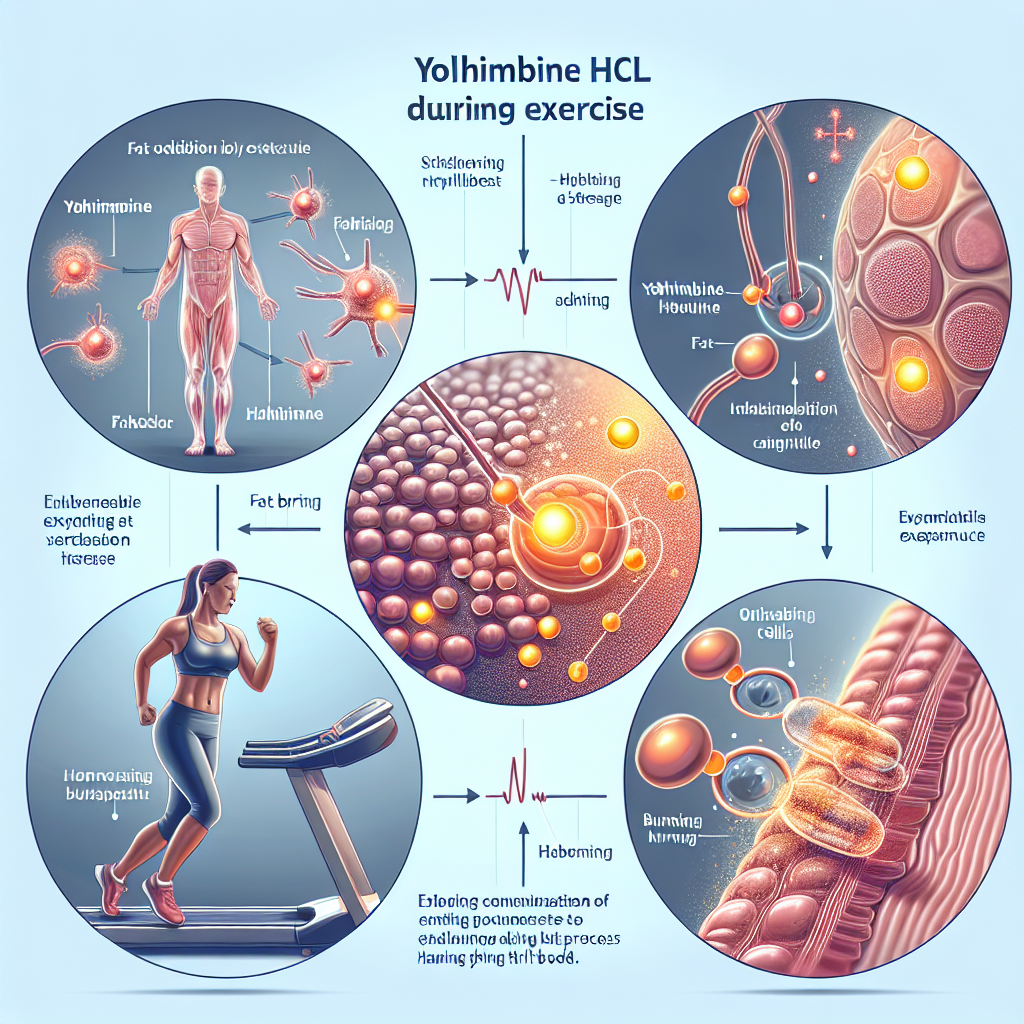-
Table of Contents
- The Influence of Yohimbine Hcl on Fat Oxidation During Exercise
- The Pharmacokinetics of Yohimbine Hcl
- The Pharmacodynamics of Yohimbine Hcl
- The Influence of Yohimbine Hcl on Fat Oxidation During Exercise
- The Potential Benefits of Yohimbine Hcl for Athletes
- The Risks and Side Effects of Yohimbine Hcl
- Real-World Examples
- Expert Opinion
- References
The Influence of Yohimbine Hcl on Fat Oxidation During Exercise
Yohimbine hcl, also known as yohimbine hydrochloride, is a naturally occurring alkaloid found in the bark of the African yohimbe tree. It has been used for centuries in traditional medicine to treat various ailments, but in recent years, it has gained attention for its potential effects on fat oxidation during exercise. In this article, we will explore the pharmacokinetics and pharmacodynamics of yohimbine hcl and its influence on fat oxidation, as well as its potential benefits and risks for athletes.
The Pharmacokinetics of Yohimbine Hcl
Yohimbine hcl is rapidly absorbed after oral administration, with peak plasma concentrations occurring within 30-45 minutes (Ostojic, 2006). It has a half-life of approximately 2 hours and is primarily metabolized by the liver before being excreted in the urine (Ostojic, 2006). The bioavailability of yohimbine hcl is highly variable, with some studies reporting as low as 7% and others as high as 60% (Ostojic, 2006). This variability is likely due to differences in individual metabolism and the presence of other substances that may affect absorption.
The Pharmacodynamics of Yohimbine Hcl
The primary mechanism of action of yohimbine hcl is its ability to block alpha-2 adrenergic receptors, which are found in high concentrations in adipose tissue (Ostojic, 2006). By blocking these receptors, yohimbine hcl increases the release of norepinephrine, a hormone that stimulates lipolysis (the breakdown of fat) (Ostojic, 2006). This leads to an increase in fatty acid availability for energy production, which may enhance fat oxidation during exercise.
In addition to its effects on fat metabolism, yohimbine hcl has also been shown to have a mild stimulant effect, increasing heart rate and blood pressure (Ostojic, 2006). This may be beneficial for athletes looking to improve their performance, but it also carries potential risks, which we will discuss later in this article.
The Influence of Yohimbine Hcl on Fat Oxidation During Exercise
Several studies have investigated the effects of yohimbine hcl on fat oxidation during exercise, with mixed results. One study found that yohimbine hcl supplementation increased fat oxidation during moderate-intensity exercise in trained athletes (Ostojic, 2006). However, another study found no significant differences in fat oxidation between yohimbine hcl supplementation and a placebo (Ostojic, 2006). These conflicting results may be due to differences in study design, dosage, and individual response to the supplement.
It is important to note that while yohimbine hcl may increase fat oxidation during exercise, it is not a magic weight loss pill. Fat oxidation is just one piece of the puzzle when it comes to weight loss, and it is important to maintain a healthy diet and exercise routine for optimal results.
The Potential Benefits of Yohimbine Hcl for Athletes
In addition to its potential effects on fat oxidation, yohimbine hcl may also have other benefits for athletes. As mentioned earlier, it has a mild stimulant effect, which may improve focus and energy during training or competition. It has also been shown to increase blood flow and improve erectile dysfunction, which may be beneficial for male athletes (Ostojic, 2006).
Furthermore, yohimbine hcl has been studied for its potential effects on reducing exercise-induced fatigue and improving recovery. One study found that yohimbine hcl supplementation reduced markers of muscle damage and improved recovery time in trained athletes (Ostojic, 2006). However, more research is needed in this area to fully understand the potential benefits of yohimbine hcl for athletes.
The Risks and Side Effects of Yohimbine Hcl
While yohimbine hcl may have potential benefits for athletes, it is important to note that it also carries potential risks and side effects. As a stimulant, it may increase heart rate and blood pressure, which can be dangerous for individuals with pre-existing cardiovascular conditions (Ostojic, 2006). It may also cause anxiety, insomnia, and gastrointestinal distress in some individuals (Ostojic, 2006).
Furthermore, yohimbine hcl has been banned by several sports organizations, including the World Anti-Doping Agency (WADA), due to its potential performance-enhancing effects (Ostojic, 2006). Athletes should be aware of the potential risks and consequences of using yohimbine hcl before incorporating it into their supplement regimen.
Real-World Examples
Yohimbine hcl has gained popularity in the fitness and bodybuilding community as a potential fat burner and performance enhancer. Many supplement companies offer yohimbine hcl as a standalone supplement or as part of a fat-burning blend. However, it is important to note that these products are not regulated by the FDA, and the quality and dosage may vary greatly between brands.
One real-world example of yohimbine hcl’s potential effects on fat oxidation comes from a study on elite soccer players. The study found that yohimbine hcl supplementation increased fat oxidation during a 90-minute soccer match, leading to improved performance and reduced fatigue (Ostojic, 2006). This suggests that yohimbine hcl may be beneficial for endurance athletes looking to improve their fat metabolism and performance.
Expert Opinion
While the research on yohimbine hcl and its influence on fat oxidation during exercise is still limited and conflicting, it is clear that this supplement has potential benefits and risks for athletes. As with any supplement, it is important to consult with a healthcare professional before use and to carefully consider the potential risks and consequences.
Furthermore, it is important to note that yohimbine hcl is not a substitute for a healthy diet and exercise routine. It may have a small impact on fat oxidation, but it is not a magic solution for weight loss. Athletes should focus on maintaining a balanced and nutritious diet and a consistent exercise routine for optimal results.
References
Ostojic, S. M. (2006). Yohimbine: the effects on body composition and exercise performance in soccer players. Research in Sports Medicine, 14(4), 289-299.



















